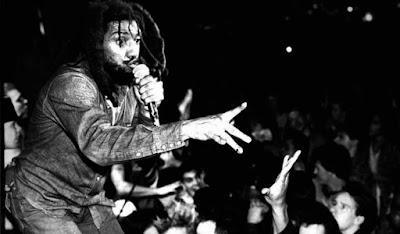Bad Brains are an American rock band formed in Washington, D.C. in 1977. They are widely regarded as among the pioneers of hardcore punk, though the band's members have objected to this term to describe their music. They are also an adept reggae band, while later recordings featured elements of other genres like funk, heavy metal, hip hop and soul. Bad Brains are followers of the Rastafari movement.
Originally formed as a jazz fusion ensemble under the name Mind Power, Bad Brains developed a very fast and intense punk rock sound which came to be labeled "hardcore", and was often played faster and more emphatically than many of their peers. The unique factor of the band's music was the fact that they played more complex rhythms than other hardcore punk bands, also adapting non-punk style guitar riffs and solos into their songs.
Bad Brains have released nine studio albums (one of which is entirely composed of instrumental versions of their early material). The band broke up and reformed several times over the years, sometimes with different singers or drummers. Since 1994, the "classic" lineup of singer H.R. (Human Rights), guitarist Dr. Know, bassist Darryl Jenifer, and drummer Earl Hudson has reunited, albeit performing sporadically. In 2013 keyboardist Jamie Saft was recruited to play with the band, fulfilling both live and studio roles. Chogyi Lama performed with the group live 2016–17.
ROCK FOR LIGHT is the second full-length album by hardcore punk pioneers Bad Brains, released in 1983. A previous album, Bad Brains, was released in 1982 but only on cassette, therefore making Rock for Light Bad Brains' first proper album. It was produced by Ric Ocasek of The Cars. The 1991 re-issue was remixed by Ocasek and bass player Darryl Jenifer. The re-issued version has some extra tracks, an altered track order, significantly different mixes and, on most tracks, a speed increase of the master which results in a raising of the pitch by one-half step.
The album contains a number of re-recorded songs from the band's first album, Bad Brains, as well as a number of new hardcore punk and reggae tracks. The only tracks from Bad Brains that did not get re-recorded for Rock for Light are "Don't Need It", "The Regulator", "Jah Calling", "Leaving Babylon", "Pay to Cum" and "I Luv Jah". It was the last Bad Brains album to feature only these two styles of music, as the band eventually experimented with funk, soul and heavy metal.
[AllMusic Review by Rick Anderson
After the tinny sound quality of the band's debut, the second Bad Brains album came as a real blast of sonic fresh air. Producer Ric Ocasek is largely responsible, but the increased tightness and focus are also a function of maturation. This band was a weird bundle of contradictions from day one: black Rastafarian instrumental virtuosos playing hardcore punk, formerly the exclusive domain of white, aggressively atheist musical amateurs.
That last contradiction would come to full musical flower on I Against I, but Rock for Light shows the band at the height of its punk energy. "P.M.A.," "Joshua's Song," and "Coptic Times" are typical examples of Bad Brains' unique blend of punk velocity and Rasta ideology. When they suddenly swing into mellow reggae (on "I and I Survive," "The Meek," "Rally 'Round Jah Throne," and the dubwise instrumental "Jam"), the effect is like some kind of pleasant musical whiplash. The 1990 CD reissue of this album was remixed by Ocasek and bassist Darryl Jenifer, and it includes several bonus tracks.]
TRACKS
01. Big Takeover 2:40
02. Attitude 1:12
03. Right Brigade 2:30
04. Joshua's Song 0:34
05. I And I Survive 5:13
06. Banned In D.C. 2:05
07. Supertouch 2:22
08. Destroy Babylon 1:25
09. F.V.K. (Fearless Vampire Killers) 0:48
10. The Meek Shall Inherit The Earth 3:43
11. I 1:57
12. Coptic Times 2:13
13. Sailin' On 1:50
14. Rock For Light 1:25
15. Rally Round Jah Throne 4:44
16. At The Movies 2:20
17. Riot Squad 2:02
18. How Low Can A Punk Get 1:55
19. We Will Not 1:40
20. Jam 1:16
FEARLESS VAMPIRE KILLERS LYRICS
The bourgeoisie had better watch out for me
All throughout this so called nation
We don't want your filthy money
We don't need your innocent bloodshed
We just wanna end your world
Well my mind's made up
Yes it's time for you to pay
Better watch out for me
I'm a member of the F. V. K

ROCK FOR LIGHT LYRICS
So you say you gonna live the truth
Well have you checked out the future of the youth
Doesn't seem to be much left for them
But there is an answer for all of Jah Children
We don't want no wars
We don't need no violence
We just want what's right
Some peace and love
We don't want no violence
We don't need no wars
We just want what's right
Rock for light
Rock for light
Rock for light...
Take it Flac Here : Size : 272 MB
























































